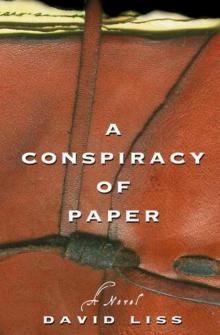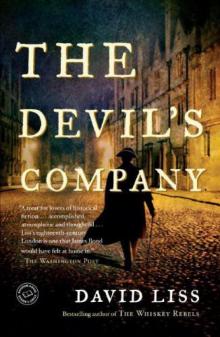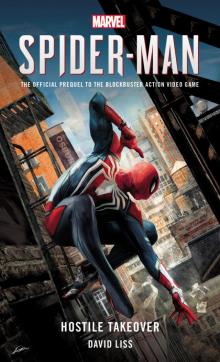- Home
- David Liss
The Day of Atonement Page 2
The Day of Atonement Read online
Page 2
There had been no public burnings for many years, but when my father finally emerged, a year or more from now, he would be emaciated and old. He would be impoverished and humiliated. And they had asked about my mother too. They would come for her soon enough. They were coming for all of us.
This was what we had feared, every day, almost every hour. It had happened. Part of me felt like perhaps this should be a relief—we no longer must wait for it. That much was true, but it was no comfort. This was the end of everything I knew.
We would never leave now. We would never escape to another country. All of that was gone. My family, my hopes, my life with Gabriela. It had vanished.
“What are we going to do?” I asked. I was trying not to cry. I wanted to be like my mother. I wanted to be about goals and tasks.
“We are doing what your father wanted,” she said. “What we both wanted. It is what we planned for.”
“Will they arrest us too?” I asked.
“I won’t let them have you,” my mother said. “Your father and I agreed on that.”
“But what about you?” I demanded. I sounded like a whiny child, and I hated it.
Her hazel eyes vanished into slits, and she turned her hard-set, oval face away from me.
She pulled me onto the quays belonging to the Factory. Beyond the swarming chaos of the piers were the great ships moored out on the massive expanse of the Tagus, like floating palaces. Smaller barges moved back and forth, perpetually bringing goods to and from the shore. We stood in the thick of English laborers, English sailors, English factors. They moved around us like ants around a stone. We remained still until one of them approached.
I knew him. He was a handsome and bewigged man, perhaps forty years of age. Charles Settwell, one of my father’s most important business contacts and his closest friend among the English.
He took off his hat and bowed at my mother. “Senhora Raposa,” he said in reasonable Portuguese, “I cannot express the depths of my sorrow at this terrible news.”
“Thank you, senhor,” she answered, her voice stiff and formal. “There is little time for sentiment, however. When does the packet leave?”
“With the tide. Soon.”
She nodded and swallowed hard. “Then there is some good fortune here, at least.”
“Of a dark kind, yes,” Mr. Settwell agreed.
“What is happening?” I demanded.
My mother lowered herself to look directly in my eyes. She was a tall woman, and I had not yet come into my full height. When she put her hands on my shoulders and crouched down like this, it made me feel like a child. Sometimes I hated it. Now, I craved it.
“They will come for me,” she told me. “They will come for you too. That you are so young will not stop them. You know that. Senhor Settwell has always been willing to help us. He will put you on the English packet, and you will go to England, where they can never harm you.”
“No,” I said. “You must come with me. We must get Papa, and we’ll all go.”
“It is too late for that,” my mother said. “It can only be you. They can smuggle a boy, not a woman. They cannot take the risk of me being caught. They risk enough with you.”
“I can’t go,” I said. “I won’t go without you.”
She began to cry then. I could see she was struggling not to, but the tears began to flow fast and hard. Her eyes were red, and her lips trembled. “Please, Sebastião. You must do what I say. You can’t know how I want to hold on to you, but if you don’t leave they will hurt you. They will make you scream, and they will make us listen to it, until we give them every name they want. Do you understand? They will use you to destroy us, and nothing you say will stop them. We could tell them everything we know, but they don’t care about what is true. They will hurt you to make us bend to their will. I know you want to help us, but the only thing you can do is be safe and free. That is how you will help me and your father.”
I was crying openly now. Under any other circumstances, I would have been furious with myself for weeping, but now I didn’t care. “But I won’t see you again,” I said. “I won’t even have the chance to say goodbye to Papa.”
“I cannot say what will happen. I pray to the saints we will find each other.” She crossed herself, and then stood and looked at the Englishman. “Take him.”
“No, Mama,” I said, but I knew the words were empty. She had made it so I could not stay. She had made it clear that to do anything but get on the barge would be a betrayal of both her and my father. To be loyal to my family, I must abandon them to the Inquisition.
I threw my arms around my mother and felt hers around me. I took in her familiar scent, and for the briefest of moments I felt safe with her. I forgot, for that second, that the future was fixed and immutable. I allowed myself to believe that things might somehow go back to how they were before.
Then the Englishman put his hand on my shoulder. “If we are to go, we must go now,” he said.
My mother pushed me away, firmly but with such warmth I felt my heart breaking anew. “I love you, my sweet boy,” she said. “We both love you. Be well, and don’t forget us.”
“No,” I whispered. “Not yet.”
She was already turning away, losing herself in the crowd. I moved to run after her, but the Englishman grabbed my arm hard.
“I know you want to,” he said, lowering himself to speak directly to me. “You’d be a wretch if you didn’t want to, but you cannot go after her. You must honor their wishes. Getting you to safety is the only power they have over the Inquisition. It is all they have left, and it will be all they will have to sustain them in the months ahead. If you love them, you will not take away that shred of comfort.”
I looked up at Mr. Settwell and saw that he too was weeping. Then I reached into my pocket and felt something. It was Gabriela’s blue scarf. I ran my fingers around and over it and I closed my eyes. I would never see her again either.
I could never say what happened in the minutes afterward. Did I later will myself to forget the moment when I chose to abandon my parents? Did I expunge from my memory the decision to escape rather than stay with Gabriela? I don’t know why I can’t recall those moments, but I am grateful that it is so.
London, 1755
It was a cold night in a rainy winter. The streets were full of melting snow and horse shit. The thief had fled through the alley, and I ran after him because that was what I did. I was a thief taker, and I was acting in accordance with my duties.
That was what I told myself: but the man in question was not really a thief. He had, however, tried to take something from me. No, that wasn’t quite true either.
He had flirted with a woman I was courting. Yes. That was certainly correct. He had tried to steal from me the woman I loved.
But again—that wasn’t right. I did not love Leonora, however deserving she might be. I had been courting her because my patron, Mr. Weaver, thought it would be good for me to seek a wife. He thought a kind woman would prove a calming influence. It was not turning out to be the case. Mr. Weaver was rarely mistaken, but this time, he had erred significantly.
I shook off my hesitation as I ran. This thief was called Harry Nunes. His ancestors were Portuguese Jews, but he had lived his whole life in England. He knew nothing about betrayal, and so he thought it was a game to take what belonged to another man. He also clearly knew nothing about the Portuguese spirit. You did not attempt to steal another man’s woman unless you were prepared to pay the price. I knew that even before I understood why a man might want to steal a woman, or to keep one.
I had heard, from children on my street—that’s how I discovered it!—that Nunes had visited Leonora. He had brought her a gift of flowers and cakes, and he had stayed for hours, visiting with her and her parents. There had, I am certain, been laughing within her home, for Nunes was a merry fellow. I was not.
Nunes was no fighter, but he was swift. When he saw me as he left his father’s silversmithing shop, he had know
n at once, and he fled. He leapt over stone and crate and broken barrel. He was as graceful as a deer, but every man’s luck runs short sooner or later, and he tripped over nothing at all—his own feet got in the way—and flew forward, sliding face-first through the muck in the alleyway.
I was on him in the span of three breaths, turning Nunes over to make sure he didn’t drown in the growing puddle. I would not have him drowning before I was done with him. The rain was coming down hard now, and lightning was slicing through the gray covering of clouds. I would have liked to think I resembled a spirit of righteous vengeance. In truth I knew what I looked like—a jealous madman.
Nunes’s lips quivered, and he formed words only after several unsuccessful attempts. “Sir,” he said. “I never meant to offer offense.”
“Then you should not have called upon Miss DeCosta,” I shouted at him.
He tried to scramble away, but my grip on his collar was tight. “She told me she did not think you were serious in your interest in her,” he said. His eyes were wide, darting back and forth, as though some escape were just outside his range of vision. “She says you do not love her.”
Of course I did not love her. I was not made for such feelings, but I did not like the reminder, coming from Nunes. I struck him in the face, feeling the warm pain of flesh against knuckles. I knew how to hit hard without doing myself too much damage. I struck him again, this time in the stomach. I was lost to my fury, but some part of me, some distant voice, did not want me to disfigure the poor fellow, to break his nose or knock loose his teeth. I raised my fist once more. The thunder and lightning seemed to be coming from within me, a product of my anger.
“Stop it, Mr. Foxx.”
I froze, but I did not turn to look. Not at first. Chasing Nunes through the wet London streets had required not a moment’s thought, but looking to see who spoke required all the courage I could muster. It was, of course, Leonora DeCosta, standing in the storm. As I came to myself, I realized where Nunes had been running—to the DeCosta home, looming above us. A tall footman held his own coat over Leonora’s head to protect her from the rain, and he was mostly successful. It was no easy task, for Miss DeCosta was tall herself, shapely and beautiful. She was also clever and witty, precisely the sort of woman who ought to have found a way into my heart.
“Miss DeCosta,” I said, dropping Nunes and straightening up. I spoke as though it were a chance encounter upon the street, as if I had been doing nothing more shameful than taking a stroll.
“Why would you do this?” she asked.
I could say nothing. It suddenly seemed too absurd. He had brought her cakes. He had sat in her parlor. There had, perhaps, been laughter.
“I’m sorry,” I said to her.
Despite the footman’s best efforts, water trickled down her face. It was rain, not tears. “I had heard,” she said, her voice hard and icy, “that you destroy everything you touch. I see now it is so.” She looked at her footman. “I shall survive a little water. Help Mr. Nunes.”
The footman appeared momentarily confused, unsure if he should obey, abandoning his mistress to the elements. She glowered at him, and he moved.
I turned away. I wanted to help Nunes myself, to apologize to him, but he would not want me. I recognized that.
The anger had been upon me, chasing and beating Nunes. I knew it well. It had been my companion for years, for almost as long as I had been in England. It was the only thing that eclipsed the grief, and that was why I had allowed it in, reveled in it.
I began to walk in the rain, not toward my home. Not toward anything. Leonora’s words stung me. I destroy everything I touch, she had said. And it was true. I thought about the friends I had made, the women I had known. They all left me soon enough. Only Mr. Weaver remained loyal. He shook his head when he heard about the things I did. He tried to talk to me, to encourage me to find other ways to vent my passions, but then I would feel the rage again, and I would do something else, and another person would be unable to forgive me.
I walked, making no effort to protect myself from the cold or from the water that poured down. I liked how it felt. I liked that it was uncomfortable and miserable. “I must do something,” I said aloud. The thought of poor Nunes running from me, as though I were a monster, filled me with shame. I remembered that day, ten years before, when I’d chased a thief through the Lisbon streets and allowed him to keep what he had stolen. I had not been a monster then. How had I become a person that my former self would have despised?
“I must do something,” I said again, though I had no idea what it could be.
Then, at once, I did know. It came to me, unbidden and fully realized. I knew how I was going to purge myself of all this anger. I was going to be someone other than a brute who beats helpless men in the rain. The answer was clear and welcoming.
I was going to have to kill someone who deserved death before I killed someone who did not.
Chapter 1
Lisbon, 1755
I am not a kind person. That much, I believe, I have established in the previous account of enraged rival-pummeling. If I am a monster, however, then I am monster made, not born.
Indeed, I was made by men such as the priest who stood before me.
A man might live in London all his life, might upon a daily basis risk encounters with cutpurses and toughs, renegados who would slit a stranger’s throat for no reason but the thrill of murder, and for all that never cross paths with anyone as dangerous as a Portuguese priest. Here was the real devil.
Standing in the gloom on the Falmouth packet ship, I watched his movements, the half-laugh and calculated smile as he peered through my cabin door. The priest’s expression revealed nothing, for deception was the way of his kind, as natural to him as lying down at day’s end is to you. But it could be my way too. I had not come to Lisbon to kill this particular priest, but I would kill him all the same if the need arose and not regret it. I’d never killed anyone in my life, but I knew I could. Refraining from murder, not the murder itself, had always been the difficult part.
The priest was not five feet in height, and so plump that he looked like a ball for a child’s fairground game. His eyes were wide and bloodshot; his nose large and red from, I supposed, a healthy appreciation of Portuguese wine; and his ears comically massive and hairy. It was impossible to conceive of a countenance less threatening than that of this stunted man with his fleshy fingers, thick as carrot stubs, wiggling as though he played upon an invisible pianoforte. The priest’s masters had chosen him for his task precisely because he seemed harmless and bumbling, the very thing to soften the Englishman’s fear of papists, a mistrust bred into his roast-beef heart since the days of Bloody Mary.
The ship upon which I had arrived had been at anchor only a few hours now, and it was necessary to undergo this little dance with the priest before I could set foot on dry land. I made no complaint. I was not yet ready to leave, though I had watched from the deck as we approached the City of Seven Hills, as Lisbon styled itself. (The claim, of course, was rubbish. There were far more than seven hills, but the great men of the capital liked to shave off a few insignificant mounds of earth, all the better to suggest a similarity to imperial Rome. Rather like suggesting a monkey resembles a lion because they both have tails, but of the city’s many crimes, an inclination to boast was among the more forgivable.)
First the packet had anchored by the stout watchtower at Belém so the health inspector might take a cursory tour through the small ship, looking into our eyes and mouths, making certain we were not spotted or vomiting or covered with boils. There we had been treated to a bit of theater. Act I: the health inspector finds much in the crew’s appearance to alarm him—sallow complexions, coughing here and there, some alarming smells from the chamber pots. These sailors, he concludes, must never be allowed to spread their contagion ashore. Act II: The captain presses into the inspector’s hands a purse bursting with silver. Act III: The inspector, upon closer examination, decides that the crew is
healthy indeed, and the packet is given permission to continue. The curtain falls, and all applaud.
As we continued on our way, I had watched as the distant palaces and monasteries and cathedrals glittered into view. Then, as we had moved east into the Tagus, came my first glimpse of the white stone and blue tiles and red terracotta roofs. There were the clusters of poor hovels in the Baixa and the Alfama. There were the flashes of green from the juniper and Mediterranean oaks and olive and lemon trees. There was the distant sound of a thousand churches ringing their bells at once.
The August sun had warmed my face as the ship sliced through the sapphire water toward this city, so strange and so familiar. In my memory, Lisbon was a place of looming dusk, its sky forever domed by sooty clouds. It was a land cast in gloom eternal, where shadows had more substance than men. Now the sunlight and the swirl of color, the indifferent beauty of the city and the sea, struck me as a species of mockery, one more deception from Lisbon’s endless supply. That was well enough. This time, I had a few deceptions of my own.
Even for the wary, a category that describes nearly every Englishman who arrives in Portugal, the city exuded its charms. Lisbon had seduced its share of pinch-faced and scornful Anglicans, come to spend a year or two, but who remained for as many decades. Poverty and despair and injustice were hidden from this distance. They were not on the skin of the beast, but in its lifeblood, flowing through secret channels and arteries, so that from the Tagus the eye fell only upon beauty paid for with Brazilian gold and diamonds. Domes and towers and arches jutted forth to announce that here was greatness, here was power. This was the story the Portuguese liked to tell themselves. If they spoke the words often enough, perhaps they could shout down the truth.

 The Whiskey Rebels
The Whiskey Rebels Renegades
Renegades The Twelfth Enchantment: A Novel
The Twelfth Enchantment: A Novel The Day of Atonement
The Day of Atonement The Devil's Company
The Devil's Company Randoms
Randoms Paleo / The Doomsday Prepper
Paleo / The Doomsday Prepper Rebels
Rebels A Spectacle of Corruption
A Spectacle of Corruption The Twelfth Enchantment
The Twelfth Enchantment The Coffee Trader
The Coffee Trader The Ethical Assassin
The Ethical Assassin The Devil’s Company: A Novel
The Devil’s Company: A Novel The Double Dealer
The Double Dealer The Whiskey Rebel
The Whiskey Rebel A Conspiracy of Paper bw-1
A Conspiracy of Paper bw-1 The Devil's Company bw-3
The Devil's Company bw-3 Marvel's SPIDER-MAN
Marvel's SPIDER-MAN